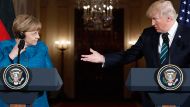Washington: President Donald Trump, less than 24 hours after a first meeting with Chancellor Angela Merkel that highlighted their divides on policy and personality, said Germany must pay the US more for providing defence.
In a series of Tweets on Saturday morning Washington time, Mr Trump said it was time for Germany to pay up.
More World News Videos
Trump to Merkel: we were wiretapped
US President Donald Trump says he and German Chancellor Angela Merkel 'have something in common,' referring to claims that Obama wiretapped both of them.
Despite what you have heard from the FAKE NEWS, I had a GREAT meeting with German Chancellor Angela Merkel. Nevertheless, Germany owes.....
— Donald J. Trump (@realDonaldTrump) 18 March 2017
...vast sums of money to NATO & the United States must be paid more for the powerful, and very expensive, defense it provides to Germany!
— Donald J. Trump (@realDonaldTrump) 18 March 2017
There was no immediate response to Mr Trump's comments from German officials.
Mr Trump's messages came less than a day after Dr Merkel, at their joint White House press conference, baited Mr Trump about his criticisms of her and others on social media.
"In the period leading up to this visit, I've always said it's much, much better to talk to one another and not about one another, and I think our conversation proved this," the German leader said through a translator.
Mr Trump on Friday said he had "reiterated to Chancellor Merkel my strong support for NATO, as well as the need for our NATO allies to pay their fair share for the cost of defence".

He said "many nations owe vast sums of money from past years and it is very unfair to the United States".
Mr Trump isn't the first US leader to complain that most NATO nations, including Germany, weren't meeting the alliance's goal that members spend 2 per cent of their GDP on defence. Germany spends about 1.2 per cent on defence now.
Former president Barack Obama in 2016 said in an interview that "free riders aggravate me".
Germany's foreign minister a few weeks ago said that meeting the 2 per cent goal was "unrealistic," though that is a much lower percentage than the United States spends on defence.
Friday's visit by Dr Merkel, postponed from earlier in the week by a snowstorm, was a day of tense cordiality and sometimes awkward body language.
Mr Trump was unresponsive when she suggested the pair shake hands in the Oval Office at the request of photographers.
There were few public attempts at the jocularity leaders often use to leaven such encounters, except for a barbed reference Mr Trump made that they had "in common, perhaps" the experience of surveillance by US intelligence. Dr Merkel didn't crack a smile at the joke.
The visit was a test of Mr Trump's foreign policy vision as he welcomed a leader who not only represents Europe's biggest economy, but has emerged as the most visible advocate of the post-World War II international order.
The new US President, a political novice before the 2016 campaign, had his first face-to-face talks with a veteran German leader whom he frequently maligned on the campaign trail, and whose free-trade, open-border politics stand in marked contrast to Mr Trump's nationalistic rhetoric.
Bloomberg
















